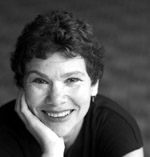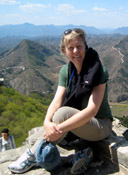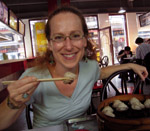
CIPS CONNECTIONS
INTERVIEWS by STEPHEN IBARAKI, FCIPS, I.S.P., ITCP, MVP, DF/NPA, CNPPart 1: Noted Panelists Tour China speaking about "Emerging Technologies in Computing":
Dr. Francine Berman, Vice President of Research, Rensselaer Polytechnic Institute and Dr. Justine Cassell, Director, Center for Technology & Social Behavior, Professor, Departments of EE and CS and Communication, Northwestern University and Dr. Tracy Camp, Professor, Dept. of Math and CS, Colorado School of Mines
This week, Stephen Ibaraki presents Part 1 of the two part exclusive interview with Dr. Francine Berman, Dr. Justine Cassell and Dr. Tracy Camp.
 Dr. Francine Berman is Vice President of Research, Rensselaer Polytechnic Institute in Troy, New York. She is an international leader in Cyber infrastructure and an advocate for sustainable data preservation. She is an ACM Fellow, Professor, and first holder of the High Performance Computing Endowed Chair at U.C. San Diego. Dr. Berman is past Director of the San Diego Supercomputer Center (SDSC) where she led a staff of more than 250 interdisciplinary scientists, engineers, and technologists in the innovation, development, and provision of computational and information infrastructure. Dr. Berman is one of the two founding Principle Investigators of the National Science Foundation's TeraGrid project (providing national Grid infrastructure), and also directed the National Partnership for Advanced Computational Infrastructure (NPACI), a consortium of 41 research groups, institutions, and university partners with the goal of building national infrastructure to support research and education in science and engineering. Dr. Berman has served on a broad spectrum of national science advisory boards including NSF's Engineering Advisory Committee, NIH's NIGMS Advisory Council, the National Academies Board of Research Data and Information, the California Council for Science and Technology, and others. She is currently co-chairing an international Blue Ribbon Task Force on Sustainable Digital Preservation and Access with economist Brian Lavoie. For her accomplishments, leadership, and vision, Dr. Berman was recognized in 2004 as one of the top women in technology by BusinessWeek, as one of the top technologists by IEEE Spectrum, and most recently as a leader in science and technology by Newsweek.
Dr. Francine Berman is Vice President of Research, Rensselaer Polytechnic Institute in Troy, New York. She is an international leader in Cyber infrastructure and an advocate for sustainable data preservation. She is an ACM Fellow, Professor, and first holder of the High Performance Computing Endowed Chair at U.C. San Diego. Dr. Berman is past Director of the San Diego Supercomputer Center (SDSC) where she led a staff of more than 250 interdisciplinary scientists, engineers, and technologists in the innovation, development, and provision of computational and information infrastructure. Dr. Berman is one of the two founding Principle Investigators of the National Science Foundation's TeraGrid project (providing national Grid infrastructure), and also directed the National Partnership for Advanced Computational Infrastructure (NPACI), a consortium of 41 research groups, institutions, and university partners with the goal of building national infrastructure to support research and education in science and engineering. Dr. Berman has served on a broad spectrum of national science advisory boards including NSF's Engineering Advisory Committee, NIH's NIGMS Advisory Council, the National Academies Board of Research Data and Information, the California Council for Science and Technology, and others. She is currently co-chairing an international Blue Ribbon Task Force on Sustainable Digital Preservation and Access with economist Brian Lavoie. For her accomplishments, leadership, and vision, Dr. Berman was recognized in 2004 as one of the top women in technology by BusinessWeek, as one of the top technologists by IEEE Spectrum, and most recently as a leader in science and technology by Newsweek.
 Dr. Tracy Camp is a Professor of computer science at the Colorado School of Mines. She is the Founder and Director of the Toilers (http://toilers.mines.edu), an active ad hoc networks research group currently consisting of 3 faculty members, 11 graduate students, and six undergraduate students. Dr. Camp has received 13 grants from the National Science Foundation, including a prestigious CAREER award in 1997. This funding has produced (1) 12 software packages that have been requested from (and shared with) more than 1300 researchers in 64 countries (as of June 2008) and (2) several research articles that have been cited over 2,500 times (per Google Scholar, as of June 2008). Dr. Camp is an ACM Distinguished Lecturer, an IEEE Senior Member, and an ACM Distinguished Scientist. In 2006, Dr. Camp was a Fulbright Scholar in New Zealand. In December 2007, Dr. Camp received the Board of Trustees Outstanding Faculty Award at the Colorado School of Mines, an award that has only been given five times between 1998-2007. Dr. Camp is currently the elected Treasurer of ACM's Special Interest Group on Mobile Computing (SIGMOBILE) and a member of the editorial boards for the IEEE Transactions on Mobile Computing, Computer Communications, and Pervasive and Mobile Computing. Dr. Camp shares her life with Max (born in 2000), Emma (born in 2003), her stay-at-home husband (Glen), and two pets (a cat Scully and a dog Jessie). All six of them are vegetarians who tremendously enjoy living in the foothills of the Rockies.
Dr. Tracy Camp is a Professor of computer science at the Colorado School of Mines. She is the Founder and Director of the Toilers (http://toilers.mines.edu), an active ad hoc networks research group currently consisting of 3 faculty members, 11 graduate students, and six undergraduate students. Dr. Camp has received 13 grants from the National Science Foundation, including a prestigious CAREER award in 1997. This funding has produced (1) 12 software packages that have been requested from (and shared with) more than 1300 researchers in 64 countries (as of June 2008) and (2) several research articles that have been cited over 2,500 times (per Google Scholar, as of June 2008). Dr. Camp is an ACM Distinguished Lecturer, an IEEE Senior Member, and an ACM Distinguished Scientist. In 2006, Dr. Camp was a Fulbright Scholar in New Zealand. In December 2007, Dr. Camp received the Board of Trustees Outstanding Faculty Award at the Colorado School of Mines, an award that has only been given five times between 1998-2007. Dr. Camp is currently the elected Treasurer of ACM's Special Interest Group on Mobile Computing (SIGMOBILE) and a member of the editorial boards for the IEEE Transactions on Mobile Computing, Computer Communications, and Pervasive and Mobile Computing. Dr. Camp shares her life with Max (born in 2000), Emma (born in 2003), her stay-at-home husband (Glen), and two pets (a cat Scully and a dog Jessie). All six of them are vegetarians who tremendously enjoy living in the foothills of the Rockies.
 Dr. Justine Cassell is the director of the Center for Technology and Social Behavior at Northwestern University, and the AT&T Professor of Communication and Computer Science. Before coming to Northwestern, Cassell was a tenured associate professor at the MIT Media Lab where she directed the Gesture and Narrative Language Research Group. In 2001, Cassell was awarded the Edgerton Faculty Achievement Award at MIT; in 2008 she was awarded the Anita Borg Institute Women of Vision Leadership Award. Cassell holds undergraduate degrees in Comparative Literature from Dartmouth and in Lettres Modernes from the Universite de Besançon (France). She holds a M.Phil in Linguistics from the University of Edinburgh (Scotland) and a dual Ph.D. from the University of Chicago in Linguistics and Psychology. After having spent ten years studying verbal and non-verbal aspects of human communication Cassell began to bring her knowledge of human interaction to the design of computational systems. She directed the team that implemented the first virtual human in 1994. More recently, Cassell has explored the practical applications of virtual humans to the field of learning. Cassell has authored more than 100 book chapters, journal articles and conference proceedings, and has given more than 50 keynote addresses at international conferences. Her work has been featured widely in the press.
Dr. Justine Cassell is the director of the Center for Technology and Social Behavior at Northwestern University, and the AT&T Professor of Communication and Computer Science. Before coming to Northwestern, Cassell was a tenured associate professor at the MIT Media Lab where she directed the Gesture and Narrative Language Research Group. In 2001, Cassell was awarded the Edgerton Faculty Achievement Award at MIT; in 2008 she was awarded the Anita Borg Institute Women of Vision Leadership Award. Cassell holds undergraduate degrees in Comparative Literature from Dartmouth and in Lettres Modernes from the Universite de Besançon (France). She holds a M.Phil in Linguistics from the University of Edinburgh (Scotland) and a dual Ph.D. from the University of Chicago in Linguistics and Psychology. After having spent ten years studying verbal and non-verbal aspects of human communication Cassell began to bring her knowledge of human interaction to the design of computational systems. She directed the team that implemented the first virtual human in 1994. More recently, Cassell has explored the practical applications of virtual humans to the field of learning. Cassell has authored more than 100 book chapters, journal articles and conference proceedings, and has given more than 50 keynote addresses at international conferences. Her work has been featured widely in the press.
To listen to Part 1 of the two part interview, click on this MP3 file link
The latest blog on the interview can be found in the IT Managers Connection (IMC) forum where you can provide your comments in an interactive dialogue.
http://blogs.technet.com/cdnitmanagers/
DISCUSSION:
Interview Time Index (MM:SS) and Topic | ||
| :00:44: | Dr. Francine Berman, Dr. Justine Cassell and Dr. Tracy Camp introduce themselves and describe their current roles. | |
| :02:03: | What triggered your interest in computing and which one decision do you consider your most important in your career, which one decision led to your greatest lesson or growth or challenge?
:02:20: Justine: "....I was a social science graduate student (my PhD is in Linguistics and Psychology), and it wasn't until I was a young professor that I began working in computing. The decision that led to that switch and that has been the most important in my career to date was to look for ways to use computer science to verify theories in the social sciences ...." :03:58: Fran: "....I was one of those kids who loved puzzles and thinking about analytical kinds of things so I went the math route and was unbelievably compelled by it....I was a math major in college and also in graduate school but it evolved to computer science through the theory. My first positions were in theoretical computer science. Over my career my work got increasingly applied...." :05:42: Tracy: "....Like Fran and Justine, I switched from my initial focus (I was a math major). My interest in computing evolved because of how I am completely in awe of anything that is logical. Computer science is a very logical field and my brain works in a very logical manner...." | |
| :08:02: | Based upon your experiences, what can major IT societies do to foster global collaboration?
:08:02: Fran: "....What we found going to China was that the face-to-face interactions were invaluable. I think that science is a global community and we all interact remotely with colleagues all over world all the time. But nothing beats getting to sit down next to someone and to form a relationship and to start talking about a variety of technical and non-technical activities, sharing meals together, etc. I think that the professional societies can really foster those kinds of interactions between researchers...." :09:07: Tracy: "....Having that interaction with the Chinese researchers was tremendously beneficial. Our world is getting smaller so meeting at these conferences or spending time in each other's countries is definitely the way to go to foster these global collaborations...." | |
| :09:37: | You recently did a speaking tour of China. Can you each profile your speaking topic area? :09:45: Tracy: "...My topic is in a field that I do research in which is on wireless sensor networks. (Wireless Sensor Networks: Motivation, Progress and Challenges). A wireless sensor is a tiny device that has the ability to monitor our physical world in some manner. Whether the sensor is monitoring the temperature, humidity, movement, pressure, or soil make up, there are lots of different ways that a sensing device can monitor our world. These wireless sensing devices, in addition to being able to sense something within our world, can also do some computations and store some information, as well as communicate with some other sensing devices (assuming that the sensing device has some kind of communication facility on it)...." :12:54: Fran: "....I talked about the deluge of digital data (Mobilizing the Data Deluge). Data is an integral part of our modern world. If we think about the digital data in the form of documents, text, video, audio, etc. - we are surrounded by it. The 2007 statistics say that we actually passed the time when we're creating more digital data than we have storage to be able to retain it....One of the points that I wanted to make during my talk was that digital data really serves fundamental infrastructure in the information age....I talked about the challenges of accessing, managing, mining it, etc....The solutions are really holistic. They require technical, social, regulatory, economic aspects, etc...." :14:33: Justine: "....I spoke about virtual humans and the range of computer science fields represented in the task of implementing a virtual human (Emerging Technologies for Virtual Humans). It's an interesting part because it has the ability to push researchers to make strides in a number of different fields. Fields as diverse as artificial intelligence, computer graphics, natural language processing and as well virtual humans play a major role in the entertainment industry today....Asking ourselves how we represent cultural and linguistic diversity, how do we deal with virtual humans that need to build a relationship with a real human as opposed to simply collaborating on a task...I believe that virtual humans like humanoid robots are going to be increasingly present in our world...." | |
| :18:29: | Can you share details on the universities/cities that you visited?
:18:34: Justine: "....We visited Tsinghua University in Beijing, Huazhong University of Science and Technology in Wuhan, and the South China University of Technology in Guangzhou...." :19:00: Fran: "....All three of the universities have their own special characteristics and the people were tremendously welcoming wherever we went...." :19:50: Tracy: "....Each of these universities are a major technological university in the region where they reside. An interesting thing was that while we were in China, the ACM World Finals Programming Contest was ongoing. It actually finished while we were in China. There were 7000 teams from around the world that participated in the competition from which only 100 teams qualified for the world finals in Stockholm. The teams from all three of the universities that we visited were among the 100 finalists and qualified for the world finals. These three teams attended Stockholm and competed extremely well and finished in the top 20 teams from the 100 teams that made it to the world finals. It was extremely exciting because here we were meeting the computer science students and faculty at these three universities and we got to celebrate a little bit with them..." | |
| :22:50: | How would you characterize the makeup of your audiences? :23:00: Tracy: "....The least amount was about 100 people (in the audience) and probably the most was closer to 150 or 170 attendees at each of our stops. Most of our attendees were from the universities that we were visiting....I do not know how many attendees were from other universities but I know other local universities were invited....Most of the attendees were students and I think they had an interest in a wide range of computer science topics...." :25:55: Fran: "....It was thrilling to talk with so many of the students. Students are really the leaders, scientists, politicians, and business leaders in the next decade or two. I think it is important for them to start looking at some of the interesting and complex and impossible challenges of the world...." :26:19: Tracy: "....ACM does a lot of distinguished lectures but I am not aware of any type tour like we did in China that ACM has done. All three of us are hoping that our visit will increase ACM membership. With membership in ACM comes a number of benefits both for faculty and students...." | |